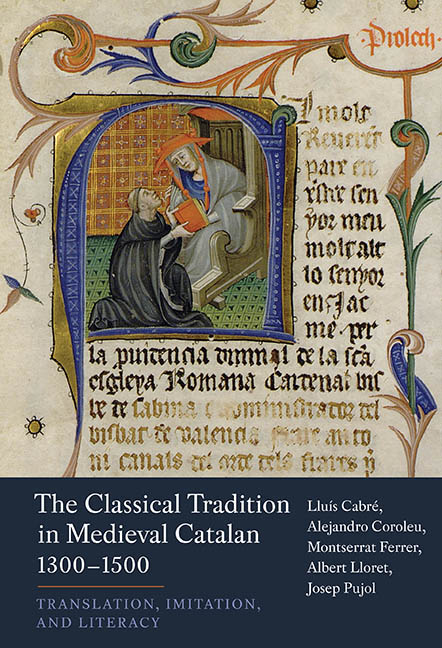Book contents
- Frontmatter
- Contents
- List of Maps
- Preface
- List of Abbreviations
- Part I The Classical Tradition in Medieval Catalan
- 1 Historical Background
- 2 Literacy: Translations and Royal Patronage
- 3 Imitation: The Classical Tradition in the Works of Five Major Authors
- 4 Printing: Humanism and the Renaissance
- Part II Catalogue of Translations to 1500
- Appendix 1 Italian Renaissance: Printed Editions, 1473–1535
- Appendix 2 Rulers of the Crown of Aragon, 1137–1516
- Bibliography
- Index of Manuscripts
- Index
2 - Literacy: Translations and Royal Patronage
from Part I - The Classical Tradition in Medieval Catalan
Published online by Cambridge University Press: 03 July 2019
- Frontmatter
- Contents
- List of Maps
- Preface
- List of Abbreviations
- Part I The Classical Tradition in Medieval Catalan
- 1 Historical Background
- 2 Literacy: Translations and Royal Patronage
- 3 Imitation: The Classical Tradition in the Works of Five Major Authors
- 4 Printing: Humanism and the Renaissance
- Part II Catalogue of Translations to 1500
- Appendix 1 Italian Renaissance: Printed Editions, 1473–1535
- Appendix 2 Rulers of the Crown of Aragon, 1137–1516
- Bibliography
- Index of Manuscripts
- Index
Summary
This chapter describes three centuries, from the start of the reign of the first count-king, Alfonso, in 1162 until the death of Crown Prince Charles, the son of John II, in 1461. Our description weaves together various threads of the cultural history of the Crown: the literacy of the royal family and the nobility, and their familiarity with Occitan, French, and Latin; the impact of this on literary output (poetry, historiography, oratory) and the promotion of translations; and the emergence of authors, almost always connected with the royal court, who wrote original works in Catalan that display their knowledge of the classical tradition. We turn our attention to the works of five such authors, works undertaken between 1399 and 1464, in more detail in Chapter 3. The reigns of John II (1458–79) and Ferdinand II (1479–1516) are covered in a separate chapter, Chapter 4, as that is when we see the emergence of Latin humanism and vernacular texts that derive directly from it, and when the advent of the printing press provided greater access to culture.
Royal Literature and the First Translations (1162–c. 1360)
The establishment of the Crown in the second half of the twelfth century coincides with the first clear signs of royal literacy and of a wide-reaching cultural initiative. Scholars talk of an ‘Alfonsine period’ in troubadour poetry because King Alfonso I (r. 1162–96) welcomed many troubadours in his Catalan– Occitan domains, and used their poetry as a political tool in his fight with the Count of Toulouse. His enthusiam for this literary form thus created a cultural bridge between the two sides of his kingdom (M. Cabré 2013: 227–34). He wrote poetry himself, and must have acquired a certain prestige from his debate with one of the poets he supported, Giraut de Bornelh, a scholar poet dubbed the ‘master of the troubadours’ in his thirteenth-century biography or vida. From the time of Alfonso I the promotion and practice of troubadour poetry became a distinctive feature of the royal house and by extension of the nobility and the court: many members of the royal family wrote poetry and composed music until the end of the fourteenth century (Cluzel 1957–8; Espadaler 2001).
- Type
- Chapter
- Information
- The Classical Tradition in Medieval Catalan, 1300–1500Translation, Imitation, And Literacy, pp. 29 - 92Publisher: Boydell & BrewerPrint publication year: 2018



